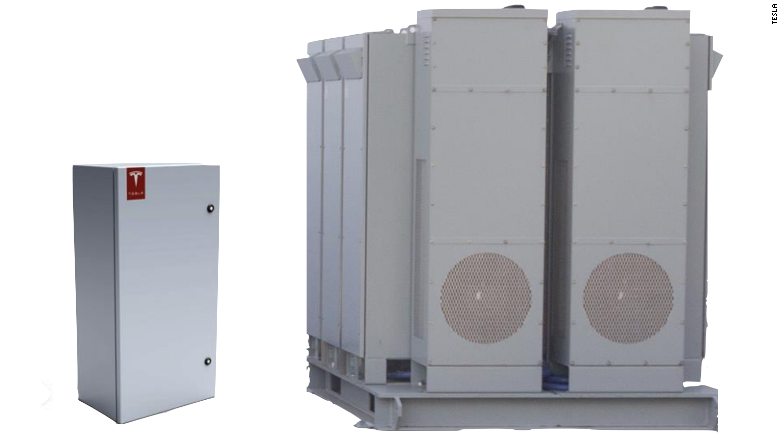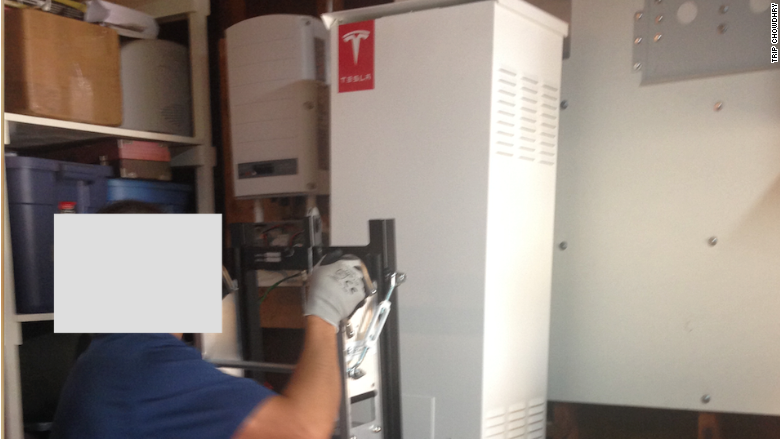Alternative Energies
See other Alternative Energies Articles
Title: Tesla wants to power your home with a battery
Source:
CNN via Slashdot
URL Source: http://money.cnn.com/2015/04/22/technology/tesla-home-battery/
Published: Apr 25, 2015
Author: David Goldman
Post Date: 2015-04-25 09:03:01 by Tooconservative
Keywords: None
Views: 13819
Comments: 46
In a letter sent to investors and analysts on Tuesday, the electric car company said it will announce a "home battery" and a "very large utility scale battery." Similar products already exist on the market, but Tesla said it will explain why its batteries are better than competitors' solutions at the event. CEO Elon Musk thinks rivals' batteries "suck," according to the note from Jeff Evanson, Tesla's investor relations director. Tesla (TSLA) shares rose more than 5% Wednesday on the news. Home batteries power up overnight, when energy companies typically charge less for electricity. Then, they can be turned on during the day to power a home. Though home batteries cost thousands of dollars, many utility companies will offer rebates. Musk announced the event late last month on Twitter, only hinting then that the new product is not a new electric car. The event will be held at Tesla's Hawthorne, California, Design Studio on April 30 at 8 p.m. PT. Tesla has talked about releasing a home battery storage product for about a year, and Musk announced on a conference call with analysts in February that Tesla would unveil a home battery "fairly soon." At a battery conference last year, Tesla's Stationary Energy Storage Director Arch Padmanabhan showed off some of the company's early plans, including a 10 kilo-Watt hour residential battery and a 400 kWh commercial/utility battery for large buildings. In a pilot project, Tesla has already begun offering home batteries to SolarCity (SCTY) customers, a solar power company for which Musk serves as chairman. There are 330 U.S. households currently running on Tesla's batteries, the majority of which are in California, according to company analyst Trip Chowdhry. Those batteries start at about $13,000, though California's Pacific Gas and Electric Co. (PCG) offers customers a 50% rebate. Tesla's batteries are three-feet high by 2.5-feet wide, and they need to be installed at least a foot and a half off the ground. They can be controlled with a Web app and a smartphone app. It's unclear if the batteries that Tesla plans on announcing next week are the same as the ones in the pilot program or in the presentation made at the battery conference last year. Tesla will introduce a battery for your home during its highly anticipated April 30 event. 

Poster Comment:
As seen at Slashdot: Tesla To Announce Battery-Based Energy Storage For Homes
Okian Warrior writes:
|
Post Comment Private Reply Ignore Thread
Top • Page Up • Full Thread • Page Down • Bottom/Latest
Begin Trace Mode for Comment # 40.
Batteries leak charge, no matter the technology. They are notorious for break down if overcharged or not charged at all. They have limited longevity and are subject to limited temperature ranges.
I am not impressed with Tesla's solution for home use at all.
#5. To: buckeroo (#4) (Edited)
Batteries leak charge, no matter the technology.
So do high-power transmission lines. That's not an argument to get rid of them.
They are notorious for break down if overcharged or not charged at all.
Less true than it once was.
I am not impressed with Tesla's solution for home use at all.
I think this is a positive move for a number of reasons. First, because you have no feasible local storage option, we have forced consumers to subsidize solar/wind massively and buy all their electricity at a high rate, even if it is dirty power or if it is generated when/where it isn't needed. So this is a way you could take away that subsidy and make these home solar/wind people consume their own electricity instead of burdening the grid (and their non-solar/non-wind neighbors) with the cost of buying their pricey electricity.
There is a new aluminum battery tech that is coming now from Stanford. Previously, aluminum batteries were unstable and couldn't recharge more than a 100 times. The new Stanford batteries can hold 2V per cell, can recharge 9,000 full cycles (24 years at full charge/discharge daily), recharge much faster and completely than other battery technologies, does not produce hazardous waste when being manufactured and can be safely recycled (unlike deadly lithuium batteries) and are fireproof (won't blow up if you drill holes in the battery while fully charged. About the only downside to these batteries is they have to be 3-4 times as big as a conventional battery. So they won't work well in electric cars but they would do fine for home/industrial storage. Instead of Tesla's small battery unit, you would have one the size of a refrigerator.
So this Tesla setup is a way to start a transition to a new generation of cheap safe aluminum batteries and a way to move away from public subsidy of wind/solar.
I am not impressed with Tesla's solution for home use at all.
Tesla's solution looks mediocre until you start comparing it to many other similar units made by lesser manufacturers who lack Musk's corporate and industrial connections and his deep finance backing, necessary to make a new technology breakthrough in consumer mindshare.
#6. To: TooConservative (#5)
Tesla's solution looks mediocre until you start comparing it to many other similar units made by lesser manufacturers who lack Musk's corporate and industrial connections and his deep finance backing, necessary to make a new technology breakthrough in consumer mindshare.
The battery is just one element of a "home battery solution." In order to charge the battery you need a DC source which infers a bridge rectifier (AC to DC); you need a regulator to ensure a proper charging rate to the battery cells.
Once charged, you need a DC to AC converter (an inverter) in order to power the home and you require a sensing mechanism to switch over the batteries from grid power.
Everything about this solution is expensive. It is not for the common man.
#7. To: buckeroo (#6)
Everything about this solution is expensive. It is not for the common man.
There are many places that still can't get wired from power lines because they are so remote and so few customers live there.
This could be a better solution.
In addition, when aluminum batteries come along, these things would be the size of a refrigerator but would cost more in the $4,000 range. And they would last 25 years or more.
We are in a time of tech transition. Tech will appear and disappear as we move on from the analog era.
#8. To: TooConservative (#7)
Tech will appear and disappear as we move on from the analog era.
Tesla's "solution" is an albatross destined to the scrapheap. It is not an efficient approach solving a problem of electrical power: it is a simple AC to DC and DC to AC electrical conversion system utilizing a high efficiency battery. It is not a true conversion power solution as in: solar-voltaic conversion.
#9. To: buckeroo (#8)
It is not a true conversion power solution as in: solar-voltaic conversion.
It doesn't have to be perfect. It just has to be better than existing solutions. The fact it is coming from a major manufacturer is a big plus in terms of installation and service.
If you're simply saying it isn't a perfect solution, then fine, I don't disagree. But that isn't really the point.
#10. To: TooConservative (#9)
In a few years when Tesla's warranty costs add up to more than any profit. Let us review our discussion on this thread.
#11. To: buckeroo (#10)
In a few years when Tesla's warranty costs add up to more than any profit. Let us review our discussion on this thread.
I would give that more weight were it not for the fact that Tesla has had considerable success with its car battery technology for over five years now.
Tesla has a certain track record for quality that many other competitors lack.
#13. To: TooConservative (#11)
Automobiles run on DC power; batteries are an excellent source of power even given the limitations of any technology about batteries.
Homes run on AC power; the successful leap from automobile power to home power is an imaginary one.
#14. To: buckeroo (#13)
Automobiles run on DC power...
Do they HAVE to?
#20. To: Chuck_Wagon (#14)
buckeroo: Automobiles run on DC power...Chuck_Wagon: Do they HAVE to?
Again, the answer is no. But why do you want to see automobiles run on AC electrical power as an alternative electrical method?
#25. To: buckeroo (#20)
Again, the answer is no.
Motors cannot run on AC power? Like my air conditioner,
or clothes dryer? Please educate me.
#28. To: Chuck_Wagon (#25)
As far as I am concerned, use any power source you want. Every power source has their unique issues, however and there is no panacea. The idea is to use power efficiently. Tesla's technology is not efficient at all.
For this thread, using a battery to store AC charge because the power companies cost less for consumable energy at night is a silly argument; the power companies can change their rates for any reason at any time irrespective of PUC rulings.
#34. To: buckeroo (#28)
Tesla's technology is not efficient at all.
The man's technology - or the current company's technology?
If you mean 'company' - then I agree with you.
I've seen nothing in the company's technology to write
home about. But I haven't been paying much attention
to high-priced electric sports cars either...
#35. To: Chuck_Wagon (#34)
The article is about "Tesla" the company. Don't confuse facts with fiction.
#38. To: buckeroo (#35)
Don't confuse facts with fiction.
So Tesla - the man's work - was worthless craziness? Eh?
#40. To: Chuck_Wagon (#38)
So Tesla - the man's work - was worthless craziness? Eh?
Kinda like a mythological "Houdini."
Replies to Comment # 40.
...mythological...
So the solar wind (Sun) - which encompasses the entire Earth
(even at night) is not something worth even looking
into as a harness-able source of power? Okey dokey.
End Trace Mode for Comment # 40.
Top • Page Up • Full Thread • Page Down • Bottom/Latest
[Home] [Headlines] [Latest Articles] [Latest Comments] [Post] [Mail] [Sign-in] [Setup] [Help] [Register]
